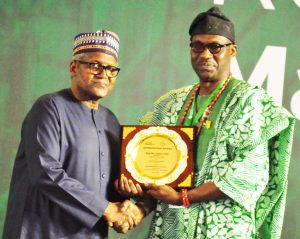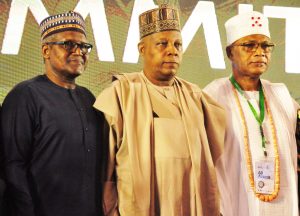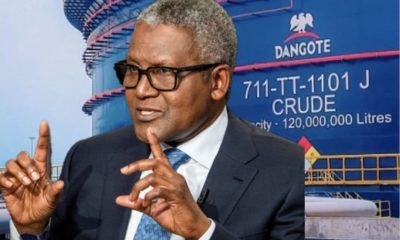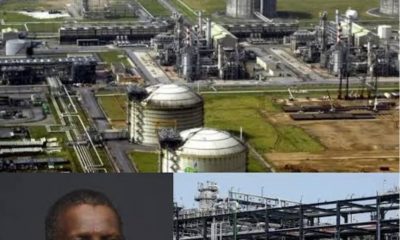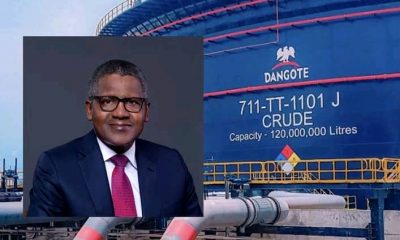Business
Global economic downturn: Dangote urges government to protect local industries.

Global economic downturn: Dangote urges government to protect local industries.
President of the Dangote Group, Aliko Dangote, has advocated for policies that safeguard domestic industries and cultivate them into indigenous champions capable of generating jobs and fostering prosperity in the face of current global economic woes.
The foremost entrepreneur told the gathering of manufacturers and investors in Abuja while delivering a speech on ‘Rethinking Manufacturing in Nigeria’ as the keynote speaker at the Nigeria Manufacturers’ Summit that Nigeria has what it takes to be prosperous.
Dangote who noted that through there are various factors contributing to the underperformance of the manufacturing sector, emphasized that the crucial issue requiring attention is government policy and its approach toward investments and investors.
He pointed out that industrial or manufacturing entities are not like trading entities while expressing his belief that the fundamental role and responsibility of government should be not only to promote investments and attract investors in manufacturing but also to ensure that these investments are nurtured and protected to facilitate growth and sustainability.
“In every economic regime, including the most advanced, investment projects in manufacturing and industrial sectors need time and a conducive environment for them to mature, build capacity and scale, to become competitive against those in older and more mature markets.
“But since the Mid 1980’s non-industrialized countries and their leaders have been discouraged from protecting and supporting such investment and forced to expose them to unfair competition from stronger, older competitors in their own internal market, even before the newcomers are commissioned. Yet these same older/bigger players are well supported in their home markets,” he said.
He listed several examples of government intervention to protect industries: the blocked sale of US steel to Nippon Steel of Japan, the blocked sale of six US port management companies to Dubai Ports World, restrictions on Chinese cranes at US ports, and the US imposition of tariffs such as 100% on Chinese EVs, 50% on semiconductors, medical products, and solar panels. He also cited the restriction of Russian gas supply to Europe, which led European countries to increase coal usage despite opposition to fossil fuels, and the US government’s distribution of $39 billion in subsidies to incentivize local microchip production.
Dangote referred to Asia as having achieved significant levels of industrialization by pursuing industrial policies where the government played an active role in nurturing and supporting local companies. They subsequently leveraged this success to attract foreign direct investment (FDI) into Free Trade Zones.
He emphasized that Government Protection of the industry, does not solely encompass short to medium-term Regulatory Mechanisms such as tax holidays and other incentives which have their place in industrial policy and should be applied when necessary to mitigate investment challenges.
“I am concerned with a long term policy framework which ensures that investors can invest with the understanding that the industry will in the long run be regarded as a national asset and not just investor’s assets, so that when it is threatened, either by external forces or by changes in the environment beyond the control of individual operators, Government will take appropriate action to protect investors and support them to survive the threat. Almost all countries did this in response to the COVID threat. Those in the pharmaceutical industry may well remember how India protected and supported its pharmaceutical industry,” he said while noting that if such policy had been adopted in the past, Nigeria would boost a flourishing textile and tyre industry as well as functioning refineries.
“If we had adopted such a policy and Government attitude to the Textile Industry and tyre industry in the 80’s and early 90’s, perhaps our economy today will still be benefitting from the job creation capacities of these industries. Or if we had adopted this attitude to our Refining industry, Nigerians would not today be too anxious about Dangote Refinery,” he stated.
Disputing assertions that protecting domestic industries leads to reduced competitiveness, Dangote argued to the contrary, citing examples such as China, Korea, India, and various other Asian nations. He pointed out that these countries successfully developed into robust economies and posed a challenge to the established global economic order precisely because they protected their industries.
He noted that in the past, Nigeria was not competitive in cement production, producing less than 2 million tons of cement per annum up to 2007. He pointed out that due to strategic government policies and support, Nigeria has since become Africa’s largest cement producer and exporter, ranking among the top 10 globally in competitiveness.
Dangote noted that in 2023, Dangote Cement alone contributed more tax revenue to the government than the entire banking sector. “In the past, Nigeria was not competitive in cement production. Up to 2007, Nigeria produced less than 2m tons of cement per annum. Today we have about 60m tons of production capacity and another 9m under construction. The foundation for this success story was laid by an administration which decided to extend full support and protection to Nigeria’s cement industry. Today we are among the 10 most competitive cement producers in the world and the biggest cement producer and cement exporter in Africa. In 2023, Dangote Cement alone paid more taxes into the coffers of the government than the entire banking industry,” he said.
Dangote also refuted claims that protecting industries would lead to monopoly, stating that it is common knowledge that foreign investors only come when they see that local investors are also doing well.
“I am convinced that when Government Policy becomes more supportive and protective, investors will be more willing to collaborate and partner with the Government in resolving other challenges such as infrastructure deficits, market instabilities and macro-economic issues such as inflation and foreign exchange volatilities,” he added.
Reiterating that Nigeria has all it takes to develop and sustain a globally competitive manufacturing sector, Dangote called for re-thinking of her industrialization policy, by learning from leading countries in the West and the East who are actively protecting their domestic industries.
Business
Nigeria’s Inflation Drops to 15.10% as NBS Reports Deflationary Trend

Nigeria’s headline inflation rate declined to 15.10 per cent in January 2026, marking a significant drop from 27.61 per cent recorded in January 2025, according to the latest Consumer Price Index (CPI) report released by the National Bureau of Statistics.
The report also showed that month-on-month inflation recorded a deflationary trend of –2.88 per cent, representing a 3.42 percentage-point decrease compared to December 2025. Analysts say the development signals easing price pressures across key sectors of the economy.
Food inflation stood at 8.89 per cent year-on-year, down from 29.63 per cent in January 2025. On a month-on-month basis, food prices declined by 6.02 per cent, reflecting lower costs in several staple commodities.
The data suggests a sustained downward trajectory in inflation over the past 12 months, pointing to improving macroeconomic stability.
The administration of President Bola Ahmed Tinubu has consistently attributed recent economic adjustments to ongoing fiscal and monetary reforms aimed at stabilising prices, boosting agricultural output, and strengthening domestic supply chains.
Economic analysts note that while the latest figures indicate progress, sustaining the downward trend will depend on continued policy discipline, exchange rate stability, and improvements in food production and distribution.
The January report provides one of the clearest indications yet that inflationary pressures, which surged in early 2025, may be moderating.
Bank
Alpha Morgan to Host 19th Economic Review Webinar

Alpha Morgan to Host 19th Economic Review Webinar
In an economy shaped by constant shifts, the edge often belongs to those with the right information.
On Wednesday, February 25, 2026, Alpha Morgan Bank will host the 19th edition of its Economic Review Webinar, a high-level thought leadership session designed to equip businesses, investors, and individuals with timely financial and economic insight.
The session, which will hold live on Zoom at 10:00am WAT and will feature economist Bismarck Rewane, who will examine the key signals influencing Nigeria’s economic direction in 2026, including policy trends, market movements, and global developments shaping the local landscape.
With a consistent track record of delivering clarity in uncertain times, the Alpha Morgan Economic Review continues to provide practical context for decision-making in a dynamic environment.
Registration for the 19th Alpha Morgan Economic Review is free and can be completed via https://bit.ly/registeramerseries19
It is a bi-monthly platform that is open to the public and is held virtually.
Visit www.alphamorganbank to know more.
Business
GTBank Launches Quick Airtime Loan at 2.95%

GTBank Launches Quick Airtime Loan at 2.95%
Guaranty Trust Bank Ltd (GTBank), the flagship banking franchise of GTCO Plc, Africa’s leading financial services group, today announced the launch of Quick Airtime Loan, an innovative digital solution that gives customers instant access to airtime when they run out of call credit and have limited funds in their bank accounts, ensuring customers can stay connected when it matters most.
In today’s always-on world, running out of airtime is more than a minor inconvenience. It can mean missed opportunities, disrupted plans, and lost connections, often at the very moment when funds are tight, and options are limited. Quick Airtime Loan was created to solve this problem, offering customers instant access to airtime on credit, directly from their bank. With Quick Airtime Loan, eligible GTBank customers can access from ₦100 and up to ₦10,000 by dialing *737*90#. Available across all major mobile networks in Nigeria, the service will soon expand to include data loans, further strengthening its proposition as a reliable on-demand platform.
For years, the airtime credit market has been dominated by Telcos, where charges for this service are at 15%. GTBank is now changing the narrative by offering a customer-centric, bank-led digital alternative priced at 2.95%. Built on transparency, convenience and affordability, Quick Airtime Loan has the potential to broaden access to airtime, deliver meaningful cost savings for millions of Nigerians, and redefine how financial services show up in everyday life, not just in banking moments.
Commenting on the product launch, Miriam Olusanya, Managing Director of Guaranty Trust Bank Ltd, said: “Quick Airtime Loan reflects GTBank’s continued focus on delivering digital solutions that are relevant, accessible, and built around real customer needs. The solution underscores the power of a connected financial ecosystem, combining GTBank’s digital reach and lending expertise with the capabilities of HabariPay to deliver a smooth, end-to-end experience. By leveraging unique strengths across the Group, we are able to accelerate innovation, strengthen execution, and deliver a more integrated customer experience across all our service channels.”
Importantly, Quick Airtime Loan highlights GTCO’s evolution as a fully diversified financial services group. Leveraging HabariPay’s Squad, the solution reinforces the Group’s ecosystem proposition by bringing together banking, payment technology, and digital channels to deliver intuitive, one-stop experiences for customers.
With this new product launch, Guaranty Trust Bank is extending its legacy of pioneering digital-first solutions that have redefined customer access to financial services across the industry, building on the proven strength of its widely adopted QuickCredit offering and the convenience of the Bank’s iconic *737# USSD Banking platform.
About Guaranty Trust Bank
Guaranty Trust Bank (GTBank) is the flagship banking franchise of GTCO Plc, a leading financial services group with a strong presence across Africa and the United Kingdom. The Bank is widely recognized for its leadership in digital banking, customer experience, and innovative financial solutions that deliver value to individuals, businesses, and communities.
About HabariPay
HabariPay is the payments fintech subsidiary of GTCO Plc, focused on enabling fast, secure, and accessible digital payments for individuals and businesses. By integrating payments and digital technology, HabariPay supports innovative services that make everyday financial interactions simpler and more seamless.
Enquiries:
GTCO
Group Corporate Communication
[email protected]
+234-1-2715227
www.gtcoplc.com
-

 celebrity radar - gossips6 months ago
celebrity radar - gossips6 months agoWhy Babangida’s Hilltop Home Became Nigeria’s Political “Mecca”
-

 society6 months ago
society6 months agoPower is a Loan, Not a Possession: The Sacred Duty of Planting People
-

 society5 months ago
society5 months agoReligion: Africa’s Oldest Weapon of Enslavement and the Forgotten Truth
-

 news6 months ago
news6 months agoTHE APPOINTMENT OF WASIU AYINDE BY THE FEDERAL GOVERNMENT AS AN AMBASSADOR SOUNDS EMBARRASSING

